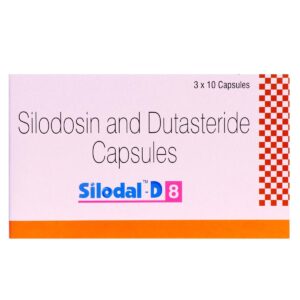DUTASTERIDE + SILODOSIN
Dutasteride: Dutasteride, sold under the brand name Avodart, is a medication primarily used to treat enlarged prostate glands, a condition known as benign prostatic hyperplasia (BPH). It may also be prescribed for the treatment of hair loss in men, a condition called male pattern baldness.
Dutasteride belongs to a class of drugs known as 5-alpha-reductase inhibitors. It works by blocking the production of the enzyme 5-alpha-reductase, which is responsible for converting testosterone into dihydrotestosterone (DHT). DHT is the hormone that causes the prostate to enlarge and contributes to hair loss in men. By inhibiting the activity of 5-alpha-reductase, dutasteride helps to reduce the size of the prostate gland and may promote hair regrowth.
The typical recommended dose of dutasteride for the treatment of BPH is 0.5 mg once daily. For the treatment of hair loss, the usual dose is also 0.5 mg daily. It is important to follow the instructions of a healthcare professional regarding dosage and duration of treatment.
Like any medication, dutasteride may cause side effects. The most common side effects include decreased libido, erectile dysfunction, ejaculation disorders, breast enlargement or tenderness, and dizziness. Some men may experience fewer ejaculations or a decrease in the amount of semen. In rare cases, dutasteride has been associated with more serious side effects, such as allergic reactions, liver problems, and heart failure. If any severe side effects occur, it is important to seek medical attention immediately.
It is worth noting that dutasteride is not approved for use in women or children. Women who are pregnant or planning to become pregnant should avoid handling crushed or broken dutasteride capsules, as it can be absorbed through the skin and potentially harm an unborn baby.
Silodosin: Silodosin is a medication commonly prescribed for the treatment of symptoms associated with enlarged prostate, also known as benign prostatic hyperplasia (BPH). It belongs to a class of drugs called alpha-1 blockers, which work by relaxing the smooth muscles in the prostate gland and the bladder neck, making it easier for patients to urinate.
The main use of Silodosin is to relieve the symptoms of BPH, including difficulty urinating, weak urine flow, frequent urination, and urgency to urinate. It does not, however, shrink the size of the prostate gland.
The recommended starting dose of Silodosin is 8 mg once daily, usually taken with food. It is important to follow the prescribed dosage and not exceed it, as higher doses do not provide any additional benefit and may increase the risk of side effects. The duration of treatment with Silodosin is generally long-term and should be discussed with a healthcare professional.
Like any medication, Silodosin may cause side effects in some individuals. Common side effects may include retrograde ejaculation (an ejaculation that goes back into the bladder instead of out of the penis), dizziness, headache, runny or stuffy nose, diarrhea, and abnormal ejaculation. These side effects are usually mild and temporary. However, if they persist or worsen, it is important to consult a healthcare provider.
In some cases, Silodosin may also cause more serious side effects, such as low blood pressure leading to dizziness or fainting, allergic reactions, severe dizziness or light-headedness, and priapism (a prolonged and painful erection). If any of these occur, immediate medical attention should be sought.
It is worth noting that Silodosin may interact with certain medications, such as other alpha-blockers, antihypertensive drugs, and drugs that affect the liver enzymes responsible for metabolizing Silodosin. Therefore, it is important to inform the healthcare provider about all medications and supplements being taken to avoid any potential drug interactions.
Overall, Silodosin is a medication commonly prescribed for the relief of symptoms associated with BPH. It works by relaxing the muscles in the prostate gland and the bladder neck, allowing for easier urination. However, it may cause side effects, and it is important to follow the prescribed dosage and consult with a healthcare provider if any concerns arise.

